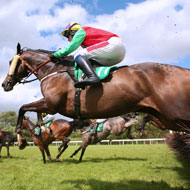
Calls to retain veterinary funding under the new Horserace Betting Right
Funding for equine veterinary research must be maintained under the new Horserace Betting Right, vets have said.
In the pre-election budget this week, it was announced that the Horserace Betting Right will replace the Horserace Betting Levy Board (HBLB), which has provided over £27 million in equine research and education since 2000.
"British racing significantly beats the rest of the world with its contributions to veterinary science," said Tim Mair, chair of the BEVA's education committee.
"The Equine Veterinary Journal has reported that over 10 per cent of its output relates to HBLB research. This is six times more than from Australia where a horseracing betting right is already in operation."
The new betting right is intended to generate more funding for the industry from off-shore gambling by selling the right to bet on horse racing, which is similar to the way musicians earn performing rights.
HBLB has provided considerable amounts of funding for infectious disease surveillance. Without this, BEVA warns that all equines in the UK could be impacted - not just racehorses.
David Mountford, BEVA's CEO, said: “This [surveillance] work is of benefit to all quarters of the equestrian world because viruses don’t distinguish between a racehorse and a pony. Any future cut-backs could affect the health of all horses and ponies in UK."
Britain is an international leader in terms of advances in equine veterinary science and improvements to health and welfare. Mr Mair said he is "cautiously optimistic" that the new funding generated will be good news for the industry, but called for a "robust mechanism" to ensure veterinary funding remains a priority.
BEVA's president Andrew Harrison concluded: "Without the horse there is no horseracing. It is essential that the racing industry continues to repay the debt owed to the horse to maintain welfare and enhance our understanding of equestrian science."



 The latest
The latest